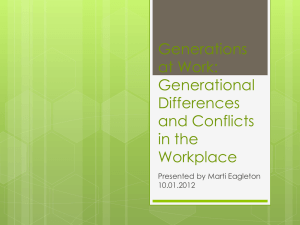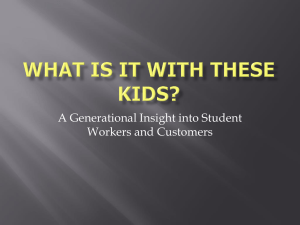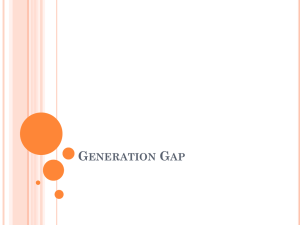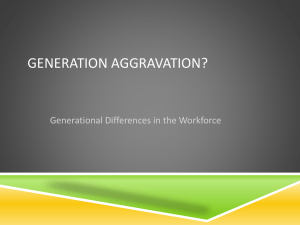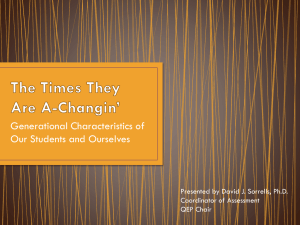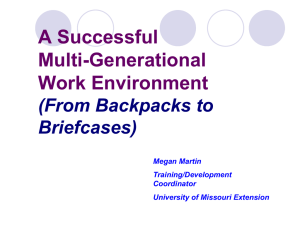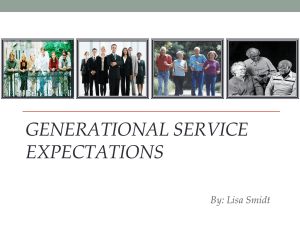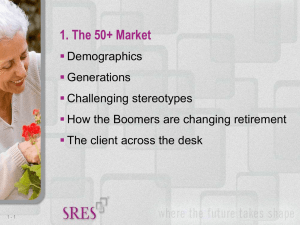Multigenerational Communication
advertisement
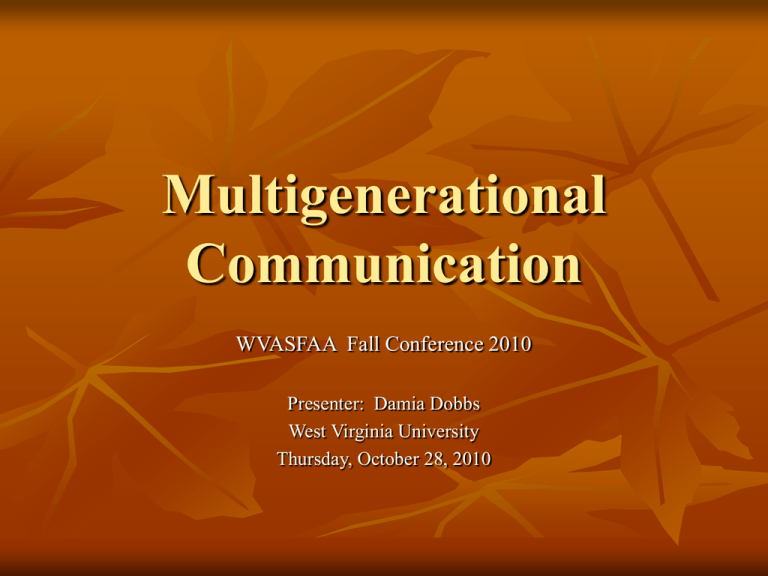
Multigenerational Communication WVASFAA Fall Conference 2010 Presenter: Damia Dobbs West Virginia University Thursday, October 28, 2010 Multigenerational Communication A generation is defined by the common attitudes, experiences and preferences that develop in the context of social and economic events of a defined period of time. Multigenerational Communication Which of the following means the most to you? Elvis joins the Army Jimi Hendrix dies MTV debuts Kurt Cobain dies Multigenerational Communication The answer depends on your age- or more specifically, on the generation that you belong to. Elvis was drafted in 1959 Jimi Hendrix died in 1970 MTV debuted in 1981 Kurt Cobain died in 1994 Multigenerational Communication Why is it important to understand the differences in generations? Different viewpoints Different ways of putting it into action Experiences, ideas and values shared by people of different generations makes for a melting pot of work approaches and priorities. Four Groups Traditionalists (1925- 1946) Baby Boomers (1947- 1964) Generation Xers (1965- 1976) Millennials or Gen Y (1977- 2000) Traditionalists Grew up with adversity Learned values from extended family Strong beliefs about hard work, ethics, right and wrong Massive layoffs in the 70s were very detrimental Women in the workplace Baby Boomers Rules are not for us Buy now, pay later Have it all and be noticed for it What we deserve It’s about experience Balance in a stress-filled schedule Baby Boomers cont. “Suburbia” was created Questioned policies, rules and practices Protests of the 60’s Creation of the middle class Quest to remain young Generation X Resourcefulness Skepticism Focus on quality Impatience with “Boomer” mentality Balance of life Peer-focused Generation X cont. Dual career couples Product of technology Employment is a contract, not a life style Smallest generation in recent history Millennials Speed/ Impatience Expectancy of choice Non-stop fun Convenience Skepticism of marketing in general Unprecedented growth Millennials cont. All conventions and individuals can be challenged One in three defined by the US government as a minority Navigate huge technology, but problems with problem solving and taking risks Traditionalist/Baby Boomer Combo Your job is what you are I remember back when…… Good things come to those who wait If your hands aren’t busy, your not working We have a system for everything Technology will never overcome hard work Millenial / Gen X Combo A job is a contract, not a calling Focus on the outcome rather than the task Balance is more important than money Management should be partners with employees Life is too short to “pay your dues” Events and Experiences Traditionalists- Loyal Great Depression New Deal World War II Korean War Events and Experiences Boomers- Optimistic Civil Rights Sexual Revolution Cold War Space Travel Assassinations of JFK, Robert Kennedy and MLK Breakdown of Family Events and Experience Generation Xers- Skeptical Fall of Berlin Wall Watergate Women’s Liberation Desert Storm Energy Crisis Events and Experiences Millennials - Realistic School Shootings Oklahoma City Technology Child Focused World Clinton/ Lewinsky Values Traditionals: Believe in conformity, authority and rules Believe in logic Very defined sense of right and wrong Loyalty and respect for authority Values Baby Boomers: Individual choice Community involvement Prosperity Ownership Self-actualizing Health and wellness Values Generation X: Contribution Feedback and recognition Autonomy Time with manager Values Millennials: Self-expression is more important than self-control Marketing and branding self is important Violence is an acceptable means of communication Fear living poorly- this is related to lifestyle enjoyment, not wealth Music Millennials have always had CD players Gen Xers had Walkmans Baby Boomers remember 8 Tracks Traditionalists listened to 45’s Pop Culture George Foreman has always been a bbq grill salesman for Millennials Cher was an actress for Gen Xers Cher was a TV star for Baby Boomers Cher was a singer for Traditionalists Space Travel For Millennials, the US and the Soviets have always been partners in space Gen Xers saw the beginning of shuttles Baby Boomers saw man on the moon Traditionalist remember John Glenn Television FOX has always been a television network choice for Millennials Gen Xers enjoyed the benefits of cable Baby Boomers enjoyed the Big Three networks ABC, NBC and CBS Traditionalists enjoyed actually having TV Style Millenial women have always had tattoos Gen Xers remembers when MTV actually played music videos. Baby Boomers will remember Woodstock and some of them won’t Traditionals survived the Great Depression “The Family Car” Millennials grew up in minivans Gen Xers and Baby Boomers actually drove to school Traditionals remember their station wagon fondly Multigenerational Work Place It is important to consider generational differences when dealing with the workplace Understanding where the individual is coming from will aid in targeting your mentoring style to bring out their strengths and make the most progress Work Styles Traditional: Consistency and uniformity Seek out technological advances Past-oriented Command and control leadership reminiscent of military operations Prefer hierarchical organizational structures and will continue to view horizontal structure in a hierarchical way Work Styles Baby Boomer: Confidence in tasks Emphasize team building Seek collaborative, group decision making Avoid conflict Work Styles Generation X: High-quality end results Productivity Balance between work and life- work to live not live to work Flexible work hours/ job sharing appealing Free agents See self as a marketing commodity Comfortable with authority but not impressed with titles Work Styles Millennials: Want to know how what they do fits into the big picture and need to understand how everything fits together- want to effect change and make an impact View their work as an expression of themselves; not as a definition of themselves Exceptional multi-taskers- need more than activity happening at a time Seek active versus passive involvement Less likely to seek managerial or team leadership positions that would compromise life outside of work Work Styles Millennials: Seek flexibility in work hours and dress code Seek a relaxed work environment- bright colors, open seating, personal touches Expect corporate social responsibility and will not work for or purchase products from organizations that are not socially responsible Seek work in teams Seek continuing learning and will take advantage of training made available to them Want everything instantly—everything now Attributes Traditional: Disciplined View an understanding of history as a way to plan for the future Dislike conflict Detail oriented Attributes Baby Boomer: Adaptive Goal-oriented Focus on individual choices and freedom Adaptive to a diverse workplace Positive attitude Attributes Generation X: Adaptability Independence Attributes Millenial: Adapt rapidly Crave change and challenge Create constantly Exceptionally resilient Committed and loyal when dedicated to an idea, cause or product Accept others of diverse backgrounds easily and openly Global perspective Career Goals Traditionalists: “Build a Legacy” Baby Boomers: “ Build a Stellar Career” Generation Xers: “Build a Portable Career” Millennials: “Build Parallel Careers” Rewards Traditionalists: “Satisfaction of a job well done” Baby Boomers: “Money, title, recognition, the corner office” Generation Xers: “Freedom is the ultimate reward” Millennials: “Work that has meaning for me” Job Changing Traditional: “Job changing carries a stigma” Baby Boomer: “Job changing puts you behind” Generation X: “Job changing is necessary” Millennial: “Job changing is part of my daily routine” Training Traditional: “I learned the hard way; you can too!” Baby Boomer: “Train them too much and they will leave” Generation X: “The more they learn, the more they stay” Millennials: “Continuous learning is a way of life” Multigenerational Communication Keeping these generational differences in mind can make dealing with co-workers, as well as students less of a challenge. Remember to discard biases and preconceived notions and enjoy the generational differences Credits Works Cited 2010 NASFAA National Conference. PPT. Managing a Multigenerational Workforce. PPT. "Meet The Multigenerational Workforce." ValueOptions®, a Leading National Managed Care Company, Specializes in Management for All Behavioral Health Issues. Web. 08 Sept. 2010. <http://www.valueoptions.com/spotlight_YIW/workforce.htm>. Thielfoldt, Diane, and Devon Scheef. "Generation X and The Millennials: What You Need to Know About Mentoring the New Generations." American Bar Association - Defending Liberty, Pursuing Justice. Aug. 2004. Web. 01 Sept. 2010. <http://www.abanet.org/lpm/lpt/articles/mgt08044.html>.

